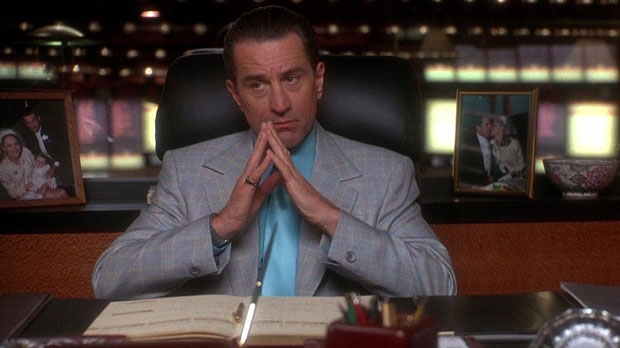 Casino (1995) Universal/Drama RT: 178 minutes Rated R (strong brutal violence, pervasive strong language, drug use, some sexuality) Director: Martin Scorsese Screenplay: Nicholas Pileggi and Martin Scorsese Music: Bobby Mackston (editor) Cinematography: Robert Richardson Release date: November 22, 1995 (US) Cast: Robert De Niro, Sharon Stone, Joe Pesci, James Woods, Don Rickles, Alan King, Kevin Pollak, L.Q. Jones, Dick Smothers, Frank Vincent, John Bloom, Pasquale Cajano, Melissa Prophet, Bill Allison, Vinny Vella, Phillip Suriano, Erika von Tagen. Box Office: $42.5M (US)/$116.1M (World)
Casino (1995) Universal/Drama RT: 178 minutes Rated R (strong brutal violence, pervasive strong language, drug use, some sexuality) Director: Martin Scorsese Screenplay: Nicholas Pileggi and Martin Scorsese Music: Bobby Mackston (editor) Cinematography: Robert Richardson Release date: November 22, 1995 (US) Cast: Robert De Niro, Sharon Stone, Joe Pesci, James Woods, Don Rickles, Alan King, Kevin Pollak, L.Q. Jones, Dick Smothers, Frank Vincent, John Bloom, Pasquale Cajano, Melissa Prophet, Bill Allison, Vinny Vella, Phillip Suriano, Erika von Tagen. Box Office: $42.5M (US)/$116.1M (World)
Rating: ***
Only a filmmaker as brilliant as Martin Scorsese can get away with making a movie that essentially has no plot like his crime drama Casino. It’s basically about the Mafia’s involvement in running the casinos of Las Vegas and how, in the end, they “f***ed it all up”.
It breaks down like this. Casino is a three-hour movie. The first hour shows us how it all worked. We see the inner workings of the casino including how the Mob successfully skimmed millions of dollars. The rest of the film’s running time is devoted to showing how it all fell apart.
The story is seen through the eyes of two people, sports handicapper/professional gambler Sam “Ace” Rothstein (De Niro, Taxi Driver) and Chicago mobster Nicky Santoro (Pesci, Goodfellas). The film literally opens with a bang (circa 1983) when Ace’s car blows up with him it. As the opening credits roll, we see him fly through the air against a backdrop of flames. Obviously, this signifies the hell his character will find himself in as the tale unfolds. In a way, Ace’s time in Vegas is similar to Dante’s journey through Hell.
Scorsese then backtracks to ten years earlier when Ace is sent to Vegas by the Outfit to run the Tangiers, a Teamsters-funded casino fronted by Philip Green (Pollak, The Usual Suspects). Nicky, a vicious psychopath, is sent to protect Ace and their interests. His volatile temper and propensity for violence ultimately get him banned from every casino in the city. Associating with a known criminal is bad news for Ace; it could prevent him from getting his gaming license which he needs to run a casino in Vegas. Then he makes the mistake of marrying Ginger McKenna (Stone, Basic Instinct), a hustler and former hooker still involved with her sleazy pimp ex-boyfriend Lester Diamond (Woods, Once Upon a Time in America). She proceeds to make his life miserable while a billion-dollar empire collapses around him.
There’s great Scorsese and good Scorsese. The former category includes Taxi Driver, Raging Bull, The King of Comedy and Goodfellas. Casino is in the latter category. It’s a good movie that, unfortunately, gets away from Scorsese more than once. Based on Nicholas Pileggi’s non-fiction book Casino: Love and Honor in Las Vegas, it’s a huge sprawling movie painted on a canvas with a glitzy surface and seedy underbelly. The screenplay by Scorsese and Pileggi is all over the place yet it seems to know exactly where it’s headed.
Another reason Casino doesn’t achieve greatness is because Scorsese self-plagiarizes quite a bit. He reuses many of the same ideas as Goodfellas. Most notably, the coke-fuelled narrative, the sense you’re on a ride veering increasingly out of control as it progresses. Also, Scorsese once again employs popular music of the time to drive different scenes. He makes excellent use of The Animals’ “The House of the Rising Sun”. His appreciation of The Rolling Stones is on display again as well. None of it sinks the movie; it just makes it feel awfully familiar.
Yet at the same time, Casino is its own movie. Look at the unusual casting. Three comedians, Don Rickles, Alan King and Dick Smothers, show up in prominent roles- Rickles as casino manager Billy Sherbert, King as Teamsters head Andy Stone and Smothers as a corrupt senator. Their very presence evokes an older era when top entertainers headlined the shows. Speaking of headlining, the three leads do tremendous work in their respective roles. Stone gives the best performance of her career as a manipulative gold-digger who lies every time she opens her mouth. She lies, steals and cheats her way through her and Ace’s travesty of a marriage. She turns to booze, coke and eventually, screwing Nicky. She is truly hateful. Pesci matches her as a psycho with absolutely no redeeming qualities. At least his character in Goodfellas was funny (don’t tell him I said that!). Nicky, who’s supposed to Ace’s best friend, is pure evil. He takes great delight in crushing a guy’s head in a vice until his eyeball pops out. What a performance! De Niro is equally terrific as a guy who’s great at picking winners and not much else. He’s smart with money, but terrible at business. He makes so many bad decisions like refusing to play ball with a connected politician (Jones, The Wild Bunch) who can easily ruin him in Vegas. He’s more concerned with the chef putting the same number of blueberries in each muffin.
Casino is a stylish, violent, thrilling, sometimes funny tale of power, crime, love and money set in a Sin City that no longer exists now that the corporations have taken over and turned it into Disneyland for families. The children play pirates while their parents lose their shirts. It’s, at once, an entertaining crime drama and a sad farewell to a way of life. Not all of it works as well as it should, but enough of it works to make it worthwhile.





